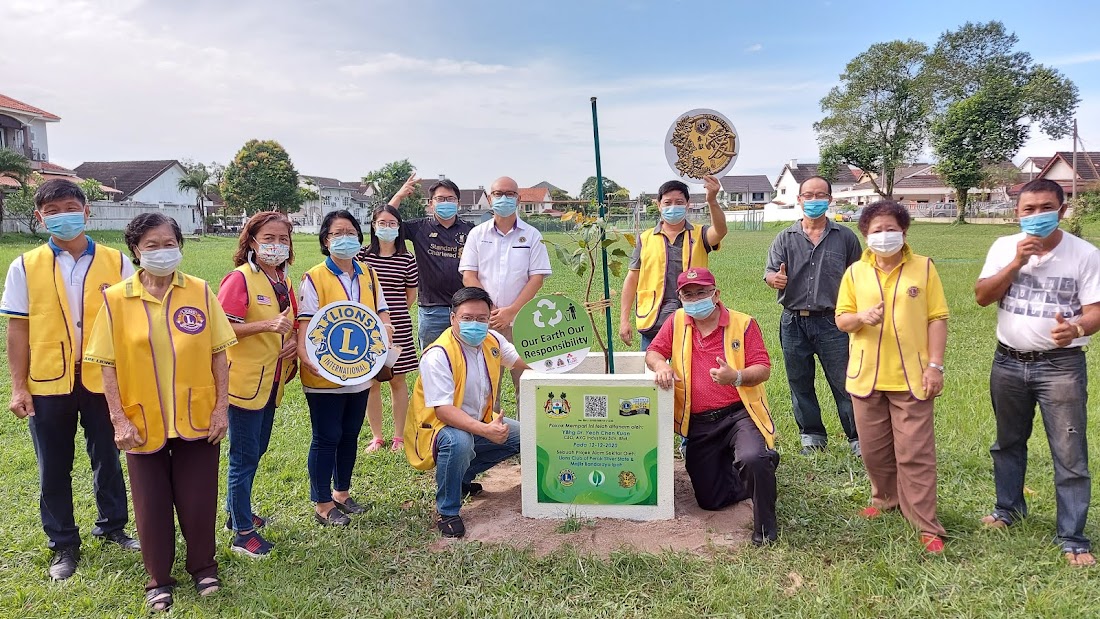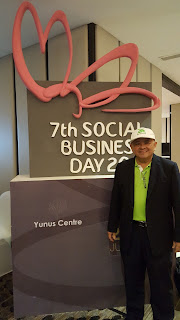Assoc. Prof. Dr. Richard Ng with Nobel Peace Prize Laureatte, Prof. Muhammad Yunus
Over 2,000 people from 40 countries converged
in Dhaka for the 7th Annual Social Business Day held from 29 to 30
July in Dhaka hosted by Nobel
Laureate Professor Muhammad Yunus. Social Business Day is an annual conference
organized by the Yunus Centre to celebrate the groundbreaking idea of social
business and to highlight new developments.
Social
Business Day showcases the concept of social business with leading experts in
the field. The annual event attracts the participation of international and
local actors, corporate and social leaders, NGOs, students, and innovators, and
connects them with the social business network. It also creates an opportunity
for participants to engage in different interactive plenary sessions and
workshops to broaden their understanding in specific areas of interest.
Coined by
Muhammad, founder of Grameen Bank, a social business only repays investors
their original investment, and reinvests 100% of its profits back into the
business to solve social problems.
The focus this was on why and how wealth concentration is a threat, and what should be the strategies to tackle this issue at regional, national and global levels. In addition, the event hosted several exciting plenary and interactive breakout sessions. One of the sessions followed up on 2015’s vision of ‘Three Zeros- Zero poverty, Zero unemployment and Zero net carbon emission’ presented by Nobel Laureate Professor Muhammad Yunus.
Malaysia was
represented by 20 participants from MyHarapan, IDR, KOHIJAU, UUM, UTP, UKM,
USM, and DHL.
Last
September, Professor Yunus was in Ipoh during the Pangkor International
Dialogue where he declared Ipoh as the 5th Social Business City
(SBC) in the world and 2nd in Asia after Fukuoka, Japan.
When I was
introduced to this event by IDR, I immediately agreed to participate as it will
provide me an opportunity to meet up with other social business practitioners.
I was inspired by what Prof. Yunus has done to help the poor solve the many
unemployment problems by creating entrepreneurs.
Koperasi Alam
Hijau Perak Berhad (KOHIJAU) was set up by members of Ipoh City Watch on 1st
of April 2016, 5 months before Ipoh was declares a Social Business City. Our
aim was to make Ipoh the most liveable city in Malaysia. At that time I have no
idea about Social Business. However, KOHIJAU has been taking initiatives to
help keep the city clean through the KOHIJAU-ICYCLE Recycling Reward Point
System through collaboration with the neighbourhood watch Rukun Tetangga
Jelapang and Residents Associations as well as other NGOs.
According to
Prof Yunus, a social business must fulfil 7 principles;
- Business objective will be to
overcome poverty, or one or more problems (such as education, health,
technology access, and environment) which threaten people and society; not
profit maximization.
- Financial and economic
sustainability
- Investors get back their
investment amount only. No dividend is given beyond investment money
- When investment amount is paid
back, company profit stays with the company for expansion and improvement
- Gender sensitive and
environmentally conscious
- Workforce gets market wage with
better working conditions
- ... do it with joy
I am sure KOHIJAU has fulfilled most if not all the
principles of a social business. KOHIJAU collaborates with other NGOs in
educating the public about recycling and reduction of garbage from going to the
landfill through the KOHIJAU-ICYCLE system. 60 percent of the income generated from
the sales of recyclables collected through this system will be channelled back
to these NGOs to fund their activities in helping to solve other social
problems.
During the 3-day Social Business Day in Dhaka, I was honoured
to meet Prof. Yunus on stage to present our KOHIJAU-ICYCLE recycling system. He
was impressed and happy to note what we did. He also agreed to sign on our
banner to show his support in promoting a recycling culture for a sustainable
environment.
Several Bangladeshi
participants from the local universities showed their keen interest in learning
from us. They have invited me to come and present it at their universities. It
was a great honour for us. I believe the system can help change the mindset of
the people as illegal garbage dumping is a huge problem in Bangladesh.
My presentation also
caught the attention of an NGO from USA, the Winner’s Circle. The team were
there to do video recording of good social business programme. They were
impressed with our recycling system as well as our plastic bags which is made
of sugar cane waste, which can decompose in 80 days. I was honoured by their
gesture of sticking the “Who I am makes the difference” sticker on my shirt to
show support for being passionate about my project.
In Perak, KOHIJAU has
launched or in the process of launching 52 recycling bins throughout Perak with
18 of them located within Ipoh since September 2016. To date, 3,000 people have
signed up as recycling members and contributed closed to 30,000 kg of recyclables
paying out almost RM3,000.
Our bins are mostly
sponsored by the government and private companies to enable the people to drop
their recyclables at a convenient location. We welcome corporate companies to
assist by sponsoring and participating in the recycling programme as part of
their CSR activities. Each bin costs RM2,000. Sponsoring companies will have
the company’s logo displayed on the recycling bin. They will also get the
report on the amount of recyclables dropped at the bin.
16 SBC units have
been created involving NGOs, schools, cooperative societies, and Rukun
Tetangga. More SBC units are expected to be created to ensure every district in
Perak is represented. KOHIJAU-ICYCLE will also set up units in other parts of
Malaysia. It will be a source of additional income for NGOs and their members
to fund their social activities while ensuring a clean and sustainable
environment.
KOHIJAU has to date
signed MOU with NGOs from Guangzhou (China), Plan@Earth in Cochin (Kerala) and
recently with EBM Global Recycling inTay Tay, Manila (Philippines). Hopefully,
another MOU with the Grameen Group and SouthEast University in Dhaka will be signed
as our next partner in Bangladesh. The MOU will enable our partner to use the
KOHIJAU-ICYCLE system to reward recycling points for contributors.
Members who
contributed their recyclables will be rewarded with recycling points. They can
check their recycling points www.icycle-global.com
and redeem their points with cash, coupons or donate to charity of their
choice.












